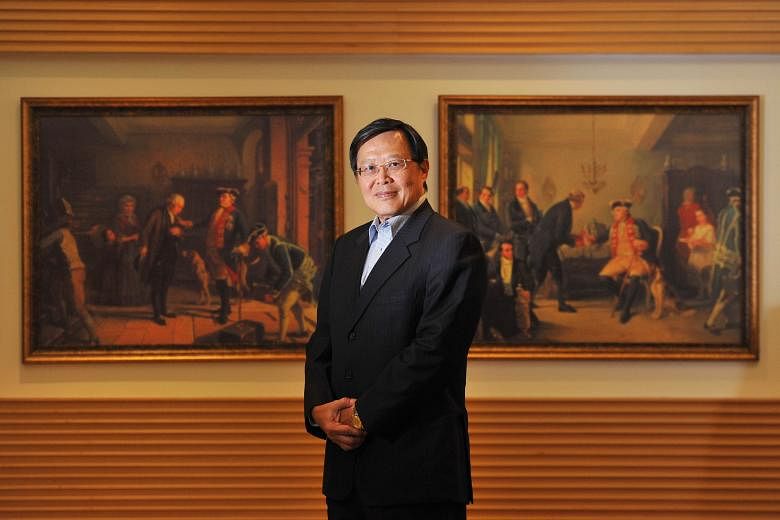After a distinguished career that had seen him through two financial crises and a terror attack, corporate veteran Henry Ho decided in 2013 that it was time to retire but friends and colleagues would not hear of it.
Mr Ho, 61, tells The Straits Times: "The first few months were glorious - nothing to do, no schedule. Then after a while I got phone calls from friends, asking for help.
"I thought I was retiring but I ended up in semi-retirement."
He has since taken up advisory roles with Fullerton Financial Holdings and Temasek International and also sits on the board of PT Chandra Asri in Indonesia, AIA Singapore and Alliance Bank in Malaysia.
Most recently, Mr Ho was named the non-executive chairman for South-east Asia at Rothschild, one of the world's largest independent financial advisory groups.
This was a coup for Rothschild, which is hoping to raise its presence in South-east Asia. By having Mr Ho on board, it can tap his deep knowledge of the region and extensive network of business people, wealthy families and regulators.
Mr Ho has built up this wealth of experience throughout his long career, which started in 1981 at Citibank Malaysia. He has since lived and worked in Thailand, Indonesia, Saudi Arabia and Singapore.
As head of Citibank Thailand, he was at the front lines of the Asian financial crisis of 1997 and 1998, a period of many sleepless nights.
"I must say that Citi was geared up for the crisis - we knew it was coming and we prepared our operations in Thailand for it," he recalls.
"But still when it happened, our loan books went soft. When the local currency went down from 25 baht against the US dollar to 40 baht, and the local interest rates shot up from 6 per cent to 25 per cent, there was no way businesses could survive," he says.
"We made some great decisions and some terrible decisions but, in such a situation, if you can make six out of 10 decisions that are right, I think you're OK."
That zen attitude has been hard won.
In 2002, during a stint at the Saudi American Bank, a Citi affiliate in Riyadh, the residential compound he was living in came under a terrorist attack. Luckily, the bomb went off quite a way from his apartment block and the family survived, but they lost some friends and were shaken by the close shave.
"My wife had gone for a walk around the compound half an hour before the bomb went off, and she had passed through the site of the attack," he recalls. He would have liked to stay longer in Riyadh but the situation became too tense and his residential compound began looking like a war zone, surrounded by military checkpoints and weapons.
Coincidentally, he was headhunted by Temasek, and decided to take up the offer and move back to Asia as the head of Bank Internasional Indonesia (BII), in which the investment firm had just bought a stake.
"My mandate was to turn BII around. Its finances were OK, but when it was under the Indonesian government there was nothing much going on. So we rebooted it and put up a strategic business proposition based on the strengths and position of the bank."
In 2008, Temasek sold its stake in BII to Maybank and, in 2009, Mr Ho returned to Singapore as a managing director of Temasek.
It was his second time going through a major financial crisis, but this time his job was very different.
"There were some wonderful deals that we did which we bought at quite distressed prices. Some of the things that we bought were at one-third their value and just six months later were paying us back a few times," he says.
"Still it was scary. Even with deep pockets, you don't know how long the crisis will last. You go through it with a lot of respect for market forces."
In 2010, he returned to Indonesia, this time to head another bank in which Temasek had bought a stake - Bank Danamon.
As with BII, his job was to help the bank realise its growth potential - a task he did so well that Danamon eventually caught the eye of DBS Bank, which attempted to acquire Temasek's majority stake in 2013.
The deal fell through as it failed to win regulatory approval, a result that Mr Ho attributed to bad luck.
"The deal made a lot of sense. We thought Danamon would benefit strategically over the longer term with a parent company like DBS. But it was unfortunate the events that unfolded, such as the Indonesian regulators changing foreign ownership laws while the talks were going on."
But again, his zen attitude prevailed: "The best way for me to view it is that it was a coincidence."
Having chalked up these experiences, Mr Ho is happy to now tap his knowledge and contacts to help Rothschild build up its South-east Asia presence.
"In the 1980s, Rothschild was quite a well-known name, actively participating in a lot of capital market transactions in this part of the world but, starting from the mid-1990s, they sort of took a step back. But now they want to do something meaningful," Mr Ho says.
"From all the discussions I've had with senior management in Paris and London, they want to invest in South-east Asia and are willing to be patient, so I decided it may not be a bad fit. It also gives me an excuse to go and meet up with old friends while helping Rothschild."

